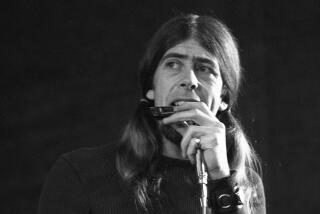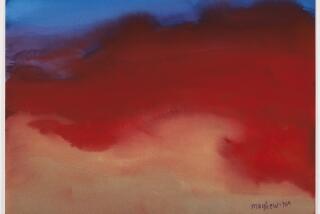‘Barrelhouse’ Pianist Brings the Style and His Wit Back Home
- Share via
SAN DIEGO — Over the decades, a mystique has developed around the expatriation of African American jazz musicians, especially to Europe.
The romantic dimensions of this quiet exodus have been fed by the players’ own articulate stories about finding racial tolerance and artistic respect bordering on fanaticism in cities such as Paris and Amsterdam.
However, we seldom hear about blues musicians in the same regard, despite the fact that large numbers of them have become pillars of regional blues enclaves on the far side of the Atlantic. Champion Jack Dupree, a legend of the form and one of the few remaining blues pioneers at age 80, has been living abroad for more than 30 years. His story differs from those of his jazz brethren only in its emphasis on the more practical aspects of expatriation.
Dupree currently is making his first extended visit to the States since 1955 (he played the Jazz and Heritage Festival in New Orleans last year). The legendary musician spoke by telephone last week from his hotel room in Memphis in anticipation of his first performance in San Diego. Dupree will play the Bacchanal on Friday.
“I left this country ‘cause I wanted more freedom and more work,” said Dupree in his economical way. “And I got it. Reason I’m still (in Europe) is ‘cause I can work as much as I want. And ‘cause I like it there, I like the people. Didn’t have family here, anyway. It was tough. Reason I’m here now is because they’re payin’ me, y’know.” Dupree chuckled softly, exposing the warmth and humor behind his seemingly cold pragmatism.
“But I have many memories of (America),” he continued. “I did it all, saw it all. I think about my life here every day. My songs are my memories. I sing about my life and what I remember.”
Dupree has much to draw upon. He was born William Thomas Dupree in New Orleans on July 4, 1910, to a Creole man and a woman of Cherokee heritage. When his parents died in a fire set by the Ku Klux Klan, the 2-year-old Dupree was sent to live in the same Colored Waifs Home where Louis Armstrong was raised.
At age 14, Dupree began hanging out in the legendary Rampart Street dives where “barrelhouse” piano reigned. He learned this powerful style, in which fists and fingers fly as though smothering a fire on the keyboard, from such musicians as Willie (Drive ‘Em Down) Hall and Kid Stormy Weather, who developed it partly to compensate for bawdy-house pianos that were never tuned. Years later, Dupree tempered his approach after hearing the sweet, rolling piano style of Leroy Carr.
Dupree spent a few years training at Kid Green’s Boxing School in New Orleans before deciding to make a living as a piano player. His rugged wit and musical skills made him a natural entertainer, but Dupree occasionally abandoned the calling for more plebeian pursuits. For a while, he hoboed extensively across the country, performing at the odd house party along the way. In 1932, he returned to boxing, taking the nickname “Champion Jack” for the 107 bouts he fought before hanging up the gloves in 1940.
Dupree made his way to Indianapolis and soon made a splash at that city’s Cotton Club as a partner with vocalist Ophelia Hoy. He began recording in 1940, and, except for a four-year stint as a Navy cook during World War II, he thereafter devoted most of his professional energies to music. For the next two decades, Dupree played the major black clubs in the major Eastern cities, especially in New York City, where he performed at the Harlem Club and the Apollo Theatre.
In 1959, Dupree toured Europe, and he liked what he saw. Within a year, he moved to London, where he recorded for the Atlantic Records label. But Dupree soon proved that he had merely relocated his wanderlust. He would eventually live for spells in Zurich; Copenhagen; Halifax, England; Stockholm, and Bollerup, Sweden, while performing at major music festivals and in clubs and concert halls all across Europe. He currently lives in Hanover, Germany, and shows no signs of slowing his pace.
“I’m busy, busy, busy,” he said. “I’m playin’ most of the time, at festivals, in halls, y’know. Don’t have time to do much else. Don’t have time to listen to other people’s music much. When I want to relax, I go to Sweden, where I have a summer house, and play with my horses. Or I stay home and paint.”
Dupree’s avocation might surprise those who think of the “blues life” as one of incessant struggling and cultural deprivation. “Been painting since 1975, abstract mostly. I brought some of my paintings with me, in fact.”
Since Dupree took up the brush, his work has been exhibited in Stockholm and other Swedish cities, where he is a bona fide celebrity.
In fact, although Dupree is well known all over the Continent, he perhaps remains least appreciated in his native land. Hopefully, his current album, “Back Home in New Orleans,” will redress that wrong to some degree. Recorded in the Crescent City last year in the spartan style of the traditional blues, the record is a testament to Dupree’s unique piano playing, to his earthy vocalizing, and to his deft marriage of country and urban blues lyric styles.
One disadvantage Dupree has faced in striving for recognition here is the fact that his songs have not been as widely covered as the tunes of bluesmen like Robert Johnson or Willie Dixon. Certainly, such Dupree originals as “Cabbage Greens,” “A Good Woman is Hard to Find” and “Calcutta Blues” can be considered classics of the genre, but Dupree’s influence on others will probably outlast any specific examples of his work.
Many American blues fans might best remember Dupree for an album he recorded in England in 1966. “Raw Blues” featured the great Otis Spann and an all-star lineup of British bluesers that included John Mayall, Eric Clapton, Keef Hartley, Tony McPhee and Peter Green. It introduced Dupree to a predominantly white American audience that was just discovering the blues, but ironically it was the Brits on the recording who would benefit most from that resurgence of interest in this American art form.
“I played with Clapton, Mayall, McPhee,” recalled Dupree. “I helped the Rollin’ Stones with the blues when they was startin’ out. Played with Bob Dylan. But those people go off and make big money and forget about the poor guys. I never see any of ‘em, haven’t for a long time. That’s OK, though, ‘cause I’m too busy anyway.”
On his current tour, Dupree is backed by his long-time partner, guitarist Kenn Lending. After a tour of major cities, the bluesman will travel to New Orleans to record another album. But he has no plans to stay in the States beyond such commitments.
“I live a good life in Europe,” he said. “I don’t make a lot of money, but I make enough to live well. Can’t ask for more than that.”
Champion Jack Dupree will perform one show at 9:30 p.m. Friday at the Bacchanal, 8022 Clairemont Mesa Blvd.
More to Read
The biggest entertainment stories
Get our big stories about Hollywood, film, television, music, arts, culture and more right in your inbox as soon as they publish.
You may occasionally receive promotional content from the Los Angeles Times.










